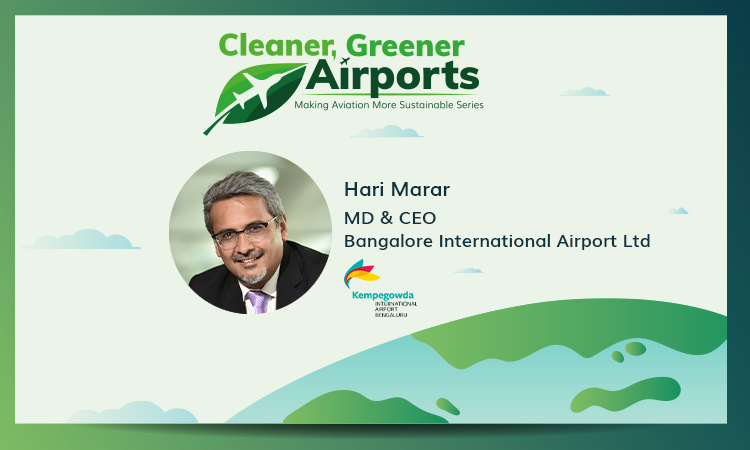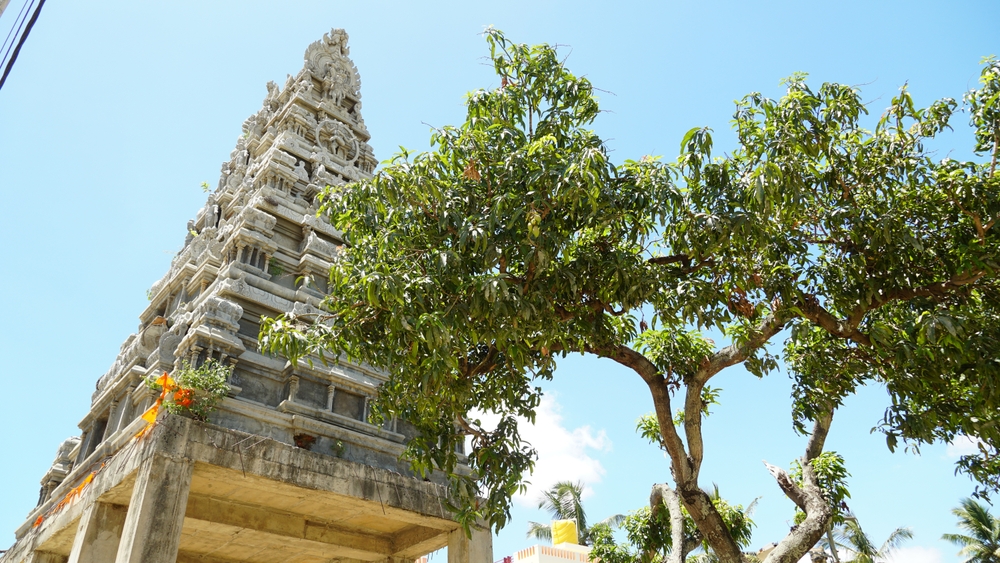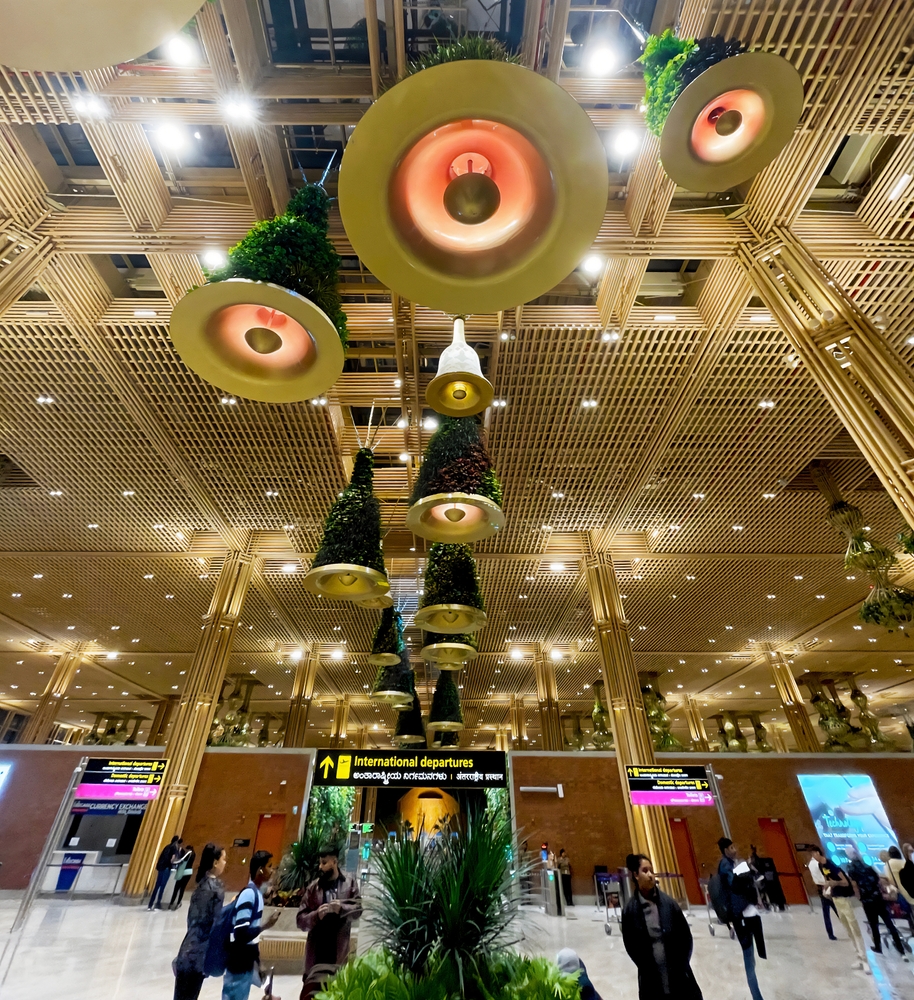Beyond connectivity: BLR Airport’s commitment to a greener tomorrow
- Like
- Digg
- Del
- Tumblr
- VKontakte
- Buffer
- Love This
- Odnoklassniki
- Meneame
- Blogger
- Amazon
- Yahoo Mail
- Gmail
- AOL
- Newsvine
- HackerNews
- Evernote
- MySpace
- Mail.ru
- Viadeo
- Line
- Comments
- Yummly
- SMS
- Viber
- Telegram
- Subscribe
- Skype
- Facebook Messenger
- Kakao
- LiveJournal
- Yammer
- Edgar
- Fintel
- Mix
- Instapaper
- Copy Link
Posted: 24 January 2024 | Hari Marar | No comments yet
In an era marked by climate concerns and environmental consciousness, airports around the world are recognising the urgent need for sustainable practices. For International Airport Review’s exclusive Cleaner, Greener Airports series, Hari Marar, Managing Director & CEO at Kempegowda International Airport Bengaluru, details how sustainability is at the core of strategic planning at India’s first greenfield airport.


Image credit: BLR
At Kempegowda International Airport Bengaluru (BLR Airport), we strive hard to create a meaningful impact not just for our customers and partners, but also for the community and environment in which we operate. Our vision extends beyond expanding operations and enhancing connectivity as we also aim to become a sustainable airport that supports the region.
‘Sustainability is at the core of the strategic planning of BLR Airport.’ These words are not merely rhetoric; they are backed by concrete actions that signal a genuine commitment to a more sustainable future. As India’s first greenfield airport, environmental responsibilities have been carefully managed during the process of setting up the airport.
Devanahalli region
In 2005, when the news of the airport’s development first emerged, it was met with uncertainty by the local community in the Devanahalli region. Over the last 15 years, we have set ourselves on a path where we strive to build partnerships that address environmental sustainability, economic stability and social responsibility, with a vision to “touch lives by nurturing a sustainable future through initiatives that drive economic, social and environmental transformation.”


In our journey, we have strived hard not only to build a robust airport, but also to be a responsible corporate entity and leave the Devanahalli region better than it used to be. Our efforts have included adopting energy-efficient infrastructure, implementing efficient waste management systems and commissioning rainwater harvesting and renewable energy projects. We have designed initiatives that benefit not only our employees but also the local community, making sure our impact is positive and lasting. The local community’s initial uncertainty has been replaced with a sense of pride in what we have accomplished together.
100% renewable energy
With the usage of renewable energy across the campus, 100% of BLR Airport’s energy consumption comes from renewable resources. Its renewable electricity infrastructure includes onsite power generation and offsite power purchase agreement for solar, hydro and wind power for airport operations. The campus currently saves energy through the implementation of technologies such as LED lighting systems and the installation of electronic charging pods for electric vehicles. To lower the amount of energy required for cooling, chiller plants with high efficiencies have been utilised and this plant optimisation has resulted in savings of over 1.7 million kwh. Through these measures, BLR Airport has been able to save 2.2 million kwh of energy every year, which is enough power to supply 9,000 homes with electricity for one entire month.
Water positivity
Currently, BLR Airport has a water positivity index of 2.36 – which means that the airport replenishes more than two times the water that it consumes. Since water conservation is a top priority in Bengaluru’s arid region, BLR Airport has adopted a water-positive approach. The airport efficiently manages water resources and contributes positively to the environment through rainwater harvesting and water recycling. Large ponds have been developed to serve as reservoirs, capturing and storing rainwater during the rainy season and an innovative weather-based smart automatic irrigation system manages the sprawling landscape efficiently.
Waste management
Recognising the importance of responsible waste management in achieving sustainability goals, BLR Airport has implemented robust waste management practices, including waste segregation, recycling and composting. These efforts significantly reduce waste sent to landfills, contributing to a cleaner environment and a more sustainable future. BLR airport is equipping an Integrated Solid Waste Management plant within the airport premises, which shall lead to achieving Zero Waste to Landfill aspiration.
Plastic circularity
In alignment with the global movement to reduce plastic waste, BLR Airport has taken proactive steps to eliminate single-use plastic items within its premises. It is the first airport in India to pave roads made of plastic waste replacing 6% bitumen in the airport premises. These initiatives reflect BLR Airport’s broader commitment to reducing its environmental footprint and promoting sustainable practices among staff and visitors.
Sustainable aviation fuel
We are part of the clean skies for tomorrow leaders. We will equip our infrastructure/supply chain to provide 10% SAF by 2030. We have also introduced a semi-robotic aircraft towing device that is a green alternative to save fuel, reduce CO2 emissions, noise pollution, decrease aircraft wear and tear, minimise instances of jet blast, improving efficiency and enhancing safety in the parking area.


Terminal in a Garden
At the heart of BIAL’s sustainability efforts lies the brand-new Terminal 2, embracing everything that we stand for. Aptly named the ‘Terminal in a Garden’, it stands as a biodiversity hotspot adorned with 3,600+ plant species, 620 endemic plants, 150 palm species, 7,700 transplanted trees, 100 varieties of lilies, 96 lotus species and 180 rare, endangered and threatened species and 10 ecological habitats. This unique terminal is a tribute to the Garden City of Bengaluru, mirroring the environment of a garden with plants sourced from many ecological regions of India.


Bengaluru Airport’s T2. Credit: Shutterstock.
Two large ponds in front of Terminal 2 serve as water reservoirs and a state-of-the-art water recycling facility enable the terminal to consume harvested water throughout the year. The green landscape is maintained by a weather-based Smart Automatic Irrigation System that is controlled by a smartphone app, making it the first of its kind. Remarkably, Terminal 2 is the world’s largest airport terminal to attain LEED Platinum Pre-certification by USGBC before commencing operations.
Leading the way in green aviation
BLR Airport has made significant strides in carbon management and reduction, achieving the highest Level 4+ Transition status under the Airport Carbon Accreditation (ACA) programme, a globally recognised initiative. This accreditation underscores the airport’s commitment to measuring, managing, and ultimately reducing its carbon emissions. BLR Airport’s dedication aligns with its vision of becoming a net zero carbon airport by 2030.
In 2022 and 2023, the airport received the prestigious Green Airports Recognition Platinum Award from Airports Council International (ACI), further affirming its contributions towards airport sustainability. This award acknowledges various sustainability initiatives, including carbon management, environmental conservation and plastics circularity.
As BLR Airport continues its journey towards becoming a net zero carbon airport, it aims to serve as an inspiration for airports worldwide, demonstrating that sustainability and operational excellence can harmoniously co-exist. With its innovative energy initiatives, water conservation efforts and social responsibility measures, BLR Airport will continuously strive to offer a brighter and greener future for all.
Hari K. Marar is the Managing Director and CEO of Bangalore International Airport Limited (BIAL), the operator of the Bangalore International Airport, the third largest airport in India. Hari is also the Chairman of Bangalore Airport Hotels Ltd. and Bengaluru Airport City Ltd. (BACL), which are the subsidiaries of BIAL. BACL is developing the airport campus into an aerotropolis, or airport city, that will be home to multiple businesses such as IT parks, knowledge and business parks, health care, biotechnology, as well as retail, entertainment, dining, concert arenas and hospitality. His vision is to transform the airport into a global leader and role model in the areas of sustainable practices, innovation led progress and technology leadership.
Related topics
Biodiversity, Cleaner, Greener Airports: Making Aviation More Sustainable Series, Emissions, Green energy, Social responsibility, Sustainability, Sustainable Aviation Fuel (SAF)



















